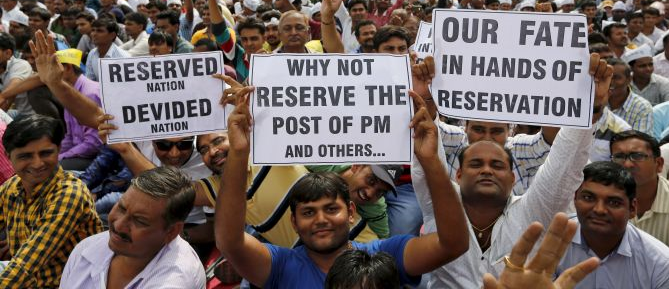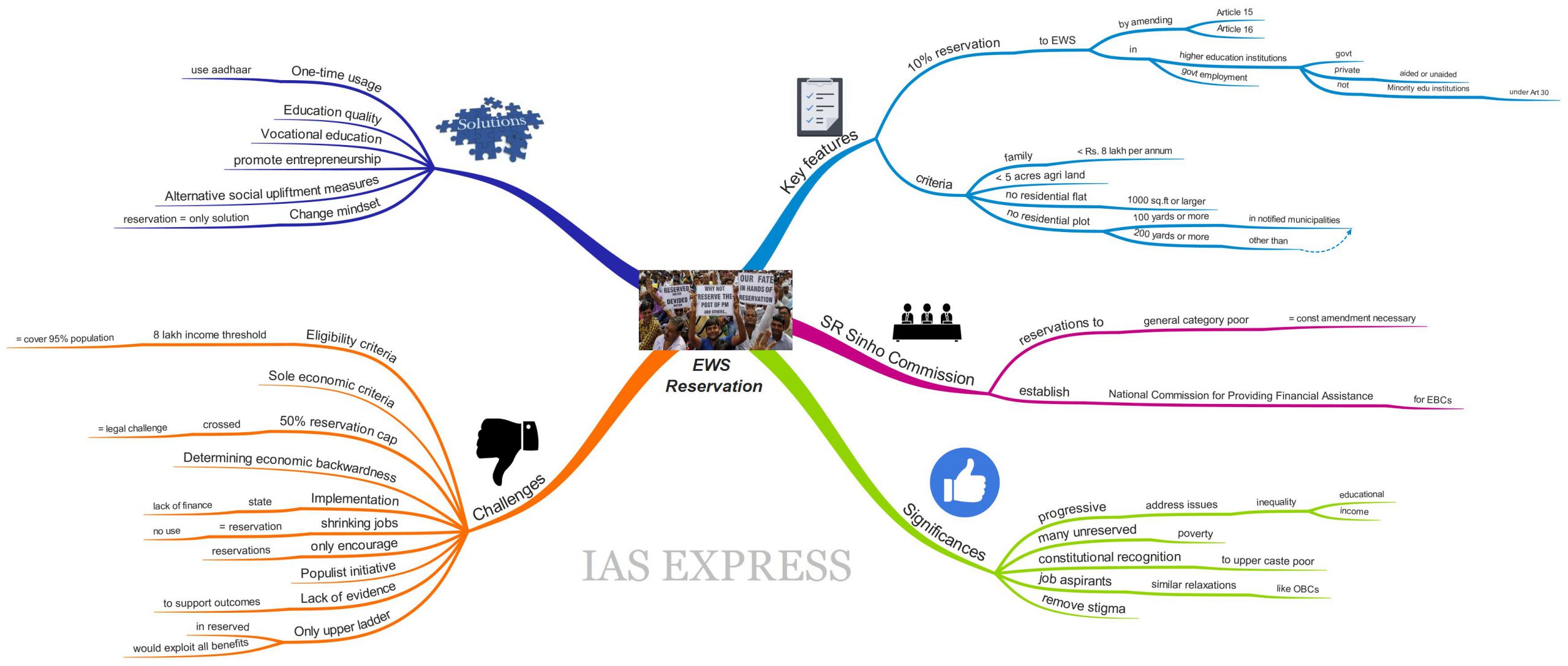Reservation for Economically Weaker Sections (EWS) – Critical Analysis

Updates *
Recently, the Parliament has passed the 124th Constitution Amendment Bill (10% Quota Bill) to provide for 10% reservation for economically weaker sections (EWS) among the general category candidates in higher education and government employment.
Before reading this article, please read The Great Indian Reservation System – Understanding its Past, Present and Solutions to get a clear idea about the reservation system in India.
This topic of “Reservation for Economically Weaker Sections (EWS) – Critical Analysis” is important from the perspective of the UPSC IAS Examination, which falls under General Studies Portion.
What are the key features?
- The bill seeks to amend Articles 15 and 16 of the constitution to provide for 10% reservation to economically weaker sections (EWS) among the general/unreserved category over and above the existing 49.5% quota in place for SC, ST, and OBCs.
- It seeks to insert a separate clause in article 16 after clause (5) as follows:
“Nothing in this article shall prevent the State from making any provision for the reservation of appointments or posts in favour of any economically weaker sections of citizens other than the classes mentioned in clause (4), in addition to the existing reservation and subject to a maximum of 10% of the posts in each category”
- It seeks 10% reservation for the economically weaker sections of society in higher educational institutions, private institutions (aided or unaided by the state) except minority educational institutions under Article 30.
- It also provides reservation in posts for initial appointment in services under the state.
- Qualifying criteria for 10% quota
- All members of whose family together earn less than Rs. 8 lakh per annum.
- Have less than 5 acres of agricultural land.
- Do not possess a residential flat of area 1000 sq. ft or larger.
- Do not possess a residential plot of area 100 yards or more in notified municipalities and 200 yards or more in areas other than notified municipalities.
What are the significances of the EWS quota?
- Currently, the economically weaker sections of citizens have remained excluded from attending higher educational institutions and public employment due to their financial incapacity. Therefore, the 10% quota is progressive and could address the issues of educational and income inequality in India.
- The reservation criteria should be economic because there are many people or class other than backward classes who are living under hunger and poverty-stricken conditions.
- The proposed reservation through a constitutional amendment would give constitutional recognition to the poor from the upper castes.
- Once the quota comes into effect, job aspirants (especially UPSC) from a general category would get similar relaxations given to OBCs.
- Moreover, it will gradually remove the stigma associated with reservation because reservation has historically been related with caste and most often the upper caste look down upon those who come through the reservation.
SR Sinho Commission on Economically Backward Classes (EBCs), 2006 (submitted report in 2010)
- The reservations in government jobs and education should be given to general category poor and a constitutional amendment is necessary with this respect.
- The commission highlighted that non-income tax payee general category people were economically backward, at par with the OBCs = they should be treated like the former.
- EBC children should be made eligible for soft loans for higher education, scholarships, coaching for central and state civil services examinations, subsidized health facilities and government support in the housing sector and suggested establishing a National Commission for providing financial assistance to EBCs.
What are the challenges before the EWS quota?
Eligibility criteria:
- Critics claim that the 8 lakh income threshold is very high and will practically cover nearly all population not already covered by reservations.
- Notably, NSSO and IT department data shows that at least 95% of Indian families will fall within this limit.
- Other eligibility criteria have also claimed to be flawed.
Sole economic criteria:
- The Supreme Court in Indra Sawhney judgement has maintained that a backward class cannot be determined mainly with respect to the economic criterion.
- Hence introducing reservation based on economic criteria would invite judicial scrutiny.
50 percent limit: The SC has put a cap for reservations at 50% – the current proposal will exceed the limit and hence could be legally challenged.
Determining economic backwardness: is a major challenge as there are concerns regarding the inclusion and exclusion of persons under the criteria.
Enforcement: The implementation of the legislation would also be a great challenge since the states do not have the finances to enforce even the present and constitutionally mandated reservations.
Shrinking jobs: When the government is trying to restrict its public services through the advancement of technology in the government system, providing quota in jobs will be a useless move.
Encouraging reservations: The intent of constitutional makers as originally manifested via Article 15 and 16 was to be reviewed after 10 years. However, instead of restricting the policy of positive discrimination, the government is pushing it in some or other forms.
Populist initiative: When elections are near, many populists’ measures are put forward by political parties such as loan waiver, reservations, etc. Considering the low levels of political literacy and awareness among masses, political parties take leverage of the same thus impacting the socio-economic and political structure at large.
Lack of proofs to back the outcomes: Even after years of reservation policy, there are no considerable pieces of evidence to support the achievements of the original intent of affirmative action. For instance, only about 4 percent each of rural Scheduled Tribe and Scheduled Caste households have a member in a government job.
Lack of Level Playing Field: It has to be noted that the Upper ladder in the reserved category are mainly benefitted from the policy whereas the benefits do not reach the marginalized. It may also happen with respect to reservation based on economic criteria as well.
Click here to read Indian Polity Mind Maps for better understanding & quick revision
What is the way forward? *
- One-time usage: Make sure that beneficiaries use their reserved category status only once in their lifetime. For example, a person shall not be allowed to use the reservation for jobs if he/she has already used it for college admissions. Aadhaar can be utilized for this purpose in order to prohibit the second usage.
- Quality of education: The government should focus on quality in addition to access. For instance, it is no use to give reservation to the poor people in college admission if the quality of the education is low = they get no job. Hence, the quality of education should be given due attention from the primary school stage itself.
- Vocational education: should be promoted with the necessary skills and knowledge to make them industry ready.
- Entrepreneurship: Create a spirit of entrepreneurship and make them job giver instead of a job seeker.
- Social upliftment measures: Alternative as well as effective social upliftment measures should be adopted instead of just focussing on reservation aspect.
Currently, the economically weaker sections of society have largely been excluded from attending the higher educational institutions and public employment due to their financial incapacity to compete on equal terms with the persons who are economically more privileged. Thus the 10% quota may help them improve their social standing.
But the challenge remains that our mindset is so driven by the reservation system that was created in a different era that we have not had the time or the interest to think about its success or to assess possible modifications.
The tragedy of the EWC quota is that it detracts from this out-of-the-box thinking.


